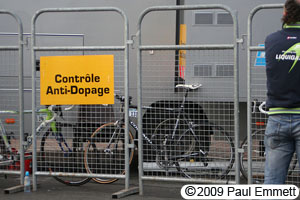Recently the Giro d’Italia made a public statement that they were increasing their efforts with respect to drug testing for the race participants.
Austrian cyclist Christian Pfannberger of team Katusha was due to take part in the race until it was announced earlier this week that he tested positive for EPO in an out-of-competition control on March 19. He has since been from his Russian team and taken off the start list.

The Giro d’Italia’s director Angelo Zomegnan told the press that the scope of their testing will include the blood-boosting drug CERA, as well as urine tests for insulin.
Beginning with the retroactive testing from last year’s Tour de France, cyclists have been getting caught for using CERA, the next generation for the drug EPO. Most recently, Italian Davide Rebellin and German Stefan Shumacher were caught for its use when retroactive tests were done on their samples taken during the 2008 Beijing Olympics. Both cyclists continue to maintain their innocence.
All 198 cyclists taking part in the Giro have already had their routine pre-race tests performed by the International Cycling Union (UCI). Italy’s grand tour has 481 exams planned for the race, and will also perform some surprise tests along the way. Last year the Tour de France adopted a targeted approach that was very successful in catching the cheaters.